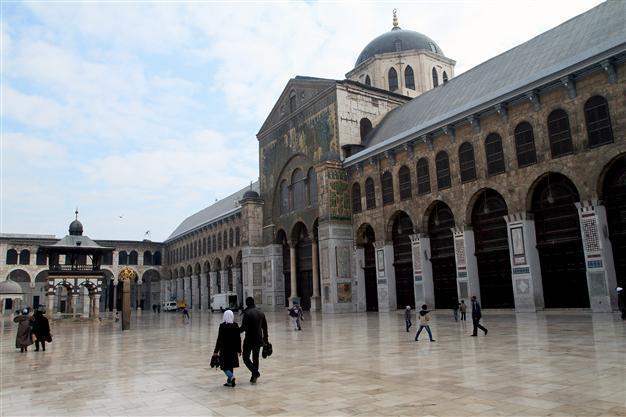UNESCO sounds alarm about illicit Syria archeology digs
UNITED NATIONS - Reuters

Syrian Muslims walk in the courtyard of the historic Umayyad Mosque before weekly prayers in Damascus, Syria, Friday, Dec. 6, 2013. AP Photo
The head of UNESCO sounded an alarm about widespread illegal archeological excavations across war-ravaged Syria on Friday, saying the U.N. cultural, education and science arm has warned auction houses, museums and collections about the problem.
More than 100,000 people have died in Syria's 2 1/2-year civil war, which has forced millions to flee their homes and created a massive humanitarian crisis. In addition to the loss of life and destruction of property, UNESCO says Syria's cultural heritage - and reporters trying to the cover the war - are increasingly under threat.
"The biggest danger there, apart from the destruction we have seen of the world heritage sites ... is the illicit archeological excavations," Irina Bokova, head of Paris-based UNESCO, told reporters. "This is something that is not very high on the radar of the international community."
Bokova was in New York on Friday to speak at an informal U.N. Security Council meeting hosted by France and Guatemala on the protection of journalists, something she said was an issue of growing concern in Syria and other conflict zones around the world where reporters are being targeted.
Earlier this week international news organizations called on Syrian rebel leaders to stop armed groups kidnapping journalists, saying dozens of abductions were preventing full media coverage of the war.
In February, Maamoun Abdulkarim, head of Syria's antiquities and museums, said illegal archeological digs have threatened tombs in the desert town of Palmyra and the Bronze Age settlement of Ebla.
Bokova said the problem has grown. She said UNESCO has raised the issue of illegal excavations with U.N. Syria peace mediator Lakhdar Brahimi and Arab League chief Nabil Elaraby.
"We were showing (them) the map of these illicit sites, excavations," Bokova said. "This is our biggest concern nowadays, that we don't know what's happening there, this illicit trafficking (and) exports" of artifacts.
She did not say whether those involved in such excavations had any alignment with Syrian President Bashar al-Assad or rebels seeking to oust him.
"Anybody can do it," she said. Bokova did not disclose details of the locations of the illicit excavations in Syria.
In September UNESCO issued what it called a "red list" of types of artifacts to alert museums, collectors and auction houses what to be on the lookout for from Syria. Bokova said illicit Syrian artifacts have surfaced in neighboring Jordan.
